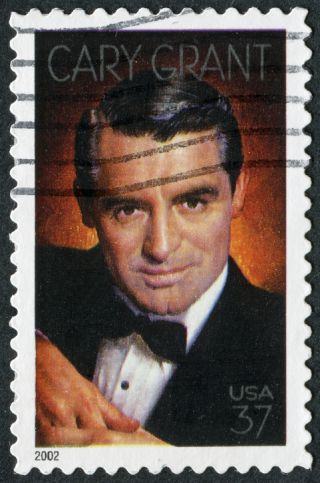Personality
Why Cary Grant Wasn't Really Cary Grant
How creating your own persona could improve your self-esteem.
Posted February 17, 2023 Reviewed by Tyler Woods
Key points
- If Archie Leach could become Cary Grant, who might you become with a little practice?
- Writing a character sketch highlights new behaviors you can practice in real life.
- By performing a mini-experiment, you can try out new behaviors and evaluate the results.

The famed movie star Cary Grant symbolized all that was elegant, sophisticated, and charming. Always self-assured, Cary Grant had a seemingly effortless grace and style. A born natural, to be sure. Or was he? Actually, the reader may recall that Cary Grant's real name was Archibald Leach. Early in his career, Archie adopted the name "Cary" from the character he played in an early film and the name "Grant" from a list of names submitted by his studio. But adopting the name did not transform Archie Leach into Cary Grant, the personality we came to know and adore, both on and off the screen.
How did Archie Leach become Cary Grant? He began by modeling himself after someone well known for his debonair style, the playwright and director Noel Coward. Cary spent hours practicing Coward's walk, his manner of speech, and even his subtle facial expressions. He was later to say, "I pretended to be someone I wanted to be and I finally became that person... Or he became me. Or we met at some point. It's a relationship." Archie became Cary through a process of role-playing and repeated practice. The more he adopted a new range of behaviors, the better he was able to integrate these behaviors within his personality—especially since these behaviors were reinforced by the admiration and respect of others.
Who's Your Inner "Cary Grant”?
Actors often adopt characteristics of the characters they routinely portray. These character features represent more than mere affectations; they seem to be integrated into the actor's personality. Thus, Cary Grant became Cary Grant, not just on-screen, but off-screen as well.
Suppose someone else were to wake up in your body tomorrow morning. We can refer to this alternate self as an alter ego. He (or she) would have some of your characteristics but differ in important ways.
Here are a few tips on developing and releasing your inner “Cary Grant:"
- Send parts of yourself away on an extended holiday. When you're ready to take the show on the road, send your usual self on a two-week vacation. Someplace south, where it's nice and warm, would be a good idea. Let’s agree that your old self will return in a few weeks, well-tanned and feeling rested. While your old self is away, your alter ego can have a go at playing yourself in some mini-experiments in your daily life. What makes this approach a Minute Therapist exercise is that it puts you into the present moment when you are enacting your alter ego.
- Bear in mind that the purpose is not to switch a new personality for your old personality. First of all, it's unrealistic to think of shelving the entire identity you've acquired over all these years in a wholesale exchange for a new personality. Secondly, you shouldn't think of this alternate personality as a preferred personality in whose image you should shape your identity. There's no way of knowing in advance which parts of the alternate role, if any, you'd want to keep. Some parts may work better than others and be retained for the future, whereas others may be shelved.
The purpose of such a bold experiment, gentle reader, is to gather data about how your alter ego gets along in the world during a trial run. How do other people in your family or among your friends react when they see you acting differently? Do they react differently to you? Would they even notice? And how do you feel enacting this role?
This exercise provides information to determine which aspects of your alter ego work well enough to be incorporated into your personality style. There's another, equally important benefit. Performing a new role brings to the surface previously hidden aspects of yourself. You might say to yourself, afterwards, "Hey, that was me performing that role. These are parts of myself I hadn't realized even existed." Perhaps you'll be able to incorporate these parts into your everyday self.
Common themes that emerge in these characterizations often center around assertiveness, self-confidence, boldness, adventurousness, risk-taking, self-acceptance, and spontaneity. The script for this new self should include some aspects of your self-identity that you merge with these new role attributes. In other words, the script shouldn't seem like an opposite persona to yourself or a complete stranger. The idea is to stretch your self-concept, not to create a new Mr. Hyde to your old Dr. Jekyll.
Now, what aspects of your personality would you like to send on a week or two hiatus? What roles would you write to take the place of your vacationing self? Perhaps you'd like to act in a bolder and more confident manner? Or perhaps you'd like to act like a winner, someone perhaps a little too cocky and self-assured?
In drafting this new self, focus on attributes that contrast with your usual behavior. Let me suggest two approaches to creating this alternate self. The first is a character sketch, a profile of an alternate personality you plan to enact during the two-week period. Plan on “wearing” this personality throughout the day, like a new suit of clothes. It is actually closer to a new pair of shoes that may not feel perfectly comfortable at first, but which becomes more comfortable after wearing them for a few days.
Write a New Script for Yourself
Here are two examples of sample scripts that clients and I drafted during therapy sessions:
- Rebecca, never Becky, is the type of woman that finds romance in life rather than books. She knows that each day is brimming with possibilities. She is awake to every opportunity to explore new dimensions in her life—seeking new experiences, developing new relationships, taking risks. Even the smallest things, like taking a bath, are experiences she savors. She never seems to rush, but she always seems to have time. Never raising her voice, she gets her point across. Sometimes, though, she appears to be lost in her own thoughts—mostly adventurous fantasies. It's not that she is unaware of the struggles of everyday life, but she seems to put a distance between herself and problems that arise. With others, she can be cool and collected or hot and fiery, but always in control, or so she makes you think. Sometimes, on the spur of the moment, she'll decide to just drop what she's doing and head off on her own.
- Rick is the type of man who is not afraid of making mistakes. Sure, he's made his share, but they seem to roll off his back. "Never look back," he tells people, "but always keep your eyes on the road." Definitely not a Ricky, Rick carries himself with a flair of bravado, a sense of derring-do. Perhaps it’s the adventurer in himself, fancying himself as being out of step in time, preferring a more elegant past when individualism seemed more in fashion. Free-spirited, though not a swashbuckler, he keeps one foot planted firmly on the ground. He seems secure in his ability to please himself, sometimes to the point of speaking his mind too plainly. But then again, there is a certain lovable, roguish charm that has a disarming quality that puts people at ease whenever they're in his company.
Taking it on the Road
After drafting your own characterization, put it aside for several days before looking at it again. Then reread it. Examine it with a fresh mind. How does it sound? Do you think the character is someone you'd like to meet or like to get to know better? Can you see yourself enacting this person for several weeks? If not, rewrite the character sketch and look at it again several days later.
When you're ready to start playing the role, schedule a two-week period for your mini-experiment. During this time, carry a written copy of the script wherever you go. Refresh your memory by re-reading the script several times a day. Keep a log or diary of your experiences, paying particular attention to how other people react to you when you're playing the role. Do you notice any differences in their behavior? Do you notice any differences in your own behavior or feelings? Does the role seem to fit certain situations better than others? Is the role more successful with some people than with others? Do you find your old self creeping back into your behavior? Sharpen your role-playing from day to day until it seems more natural.
Using your diary as a record, review the outcomes of the role-playing experiment. Are there some aspects of the role which you can adopt in your ordinary behavior? Which aspects should you keep and which should you drop? What have your learned about yourself that you weren’t aware of before?
Over time, the new role may become so well integrated that it no longer feels like you're playing a role, but rather, simply playing yourself. Then again, what is one's identity apart from the roles that we play? Is it not, as Shakespeare observed, that all the world's a stage and the people merely players?
General Disclaimer: This content is intended for informational purposes only and not for diagnosis, evaluation, or treatment of mental health disorders.
(c) 2023 Jeffrey S. Nevid




